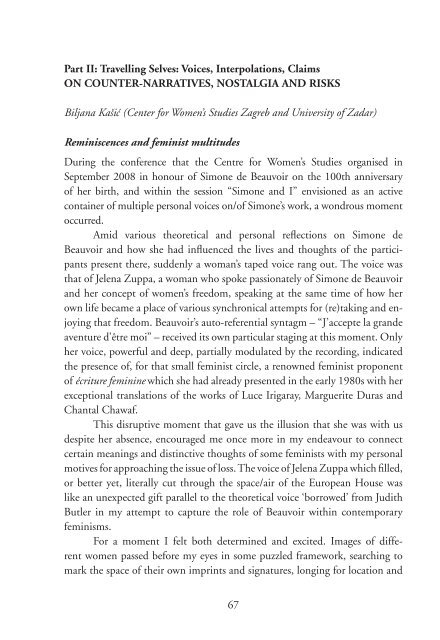Teaching Subjectivity. Travelling Selves for Feminist ... - MailChimp
Teaching Subjectivity. Travelling Selves for Feminist ... - MailChimp
Teaching Subjectivity. Travelling Selves for Feminist ... - MailChimp
You also want an ePaper? Increase the reach of your titles
YUMPU automatically turns print PDFs into web optimized ePapers that Google loves.
Part II: <strong>Travelling</strong> <strong>Selves</strong>: Voices, Interpolations, Claims<br />
ON COUNTER-NARRATIVES, NOSTALGIA AND RISKS<br />
Biljana Kašić (Center <strong>for</strong> Women’s Studies Zagreb and University of Zadar)<br />
Reminiscences and feminist multitudes<br />
During the conference that the Centre <strong>for</strong> Women’s Studies organised in<br />
September 2008 in honour of Simone de Beauvoir on the 100th anniversary<br />
of her birth, and within the session “Simone and I” envisioned as an active<br />
container of multiple personal voices on/of Simone’s work, a wondrous moment<br />
occurred.<br />
Amid various theoretical and personal reflections on Simone de<br />
Beauvoir and how she had influenced the lives and thoughts of the participants<br />
present there, suddenly a woman’s taped voice rang out. The voice was<br />
that of Jelena Zuppa, a woman who spoke passionately of Simone de Beauvoir<br />
and her concept of women’s freedom, speaking at the same time of how her<br />
own life became a place of various synchronical attempts <strong>for</strong> (re)taking and enjoying<br />
that freedom. Beauvoir’s auto-referential syntagm – “J’accepte la grande<br />
aventure d’être moi” – received its own particular staging at this moment. Only<br />
her voice, powerful and deep, partially modulated by the recording, indicated<br />
the presence of, <strong>for</strong> that small feminist circle, a renowned feminist proponent<br />
of écriture feminine which she had already presented in the early 1980s with her<br />
exceptional translations of the works of Luce Irigaray, Marguerite Duras and<br />
Chantal Chawaf.<br />
This disruptive moment that gave us the illusion that she was with us<br />
despite her absence, encouraged me once more in my endeavour to connect<br />
certain meanings and distinctive thoughts of some feminists with my personal<br />
motives <strong>for</strong> approaching the issue of loss. The voice of Jelena Zuppa which filled,<br />
or better yet, literally cut through the space/air of the European House was<br />
like an unexpected gift parallel to the theoretical voice ‘borrowed’ from Judith<br />
Butler in my attempt to capture the role of Beauvoir within contemporary<br />
feminisms.<br />
For a moment I felt both determined and excited. Images of different<br />
women passed be<strong>for</strong>e my eyes in some puzzled framework, searching to<br />
mark the space of their own imprints and signatures, longing <strong>for</strong> location and<br />
67

















